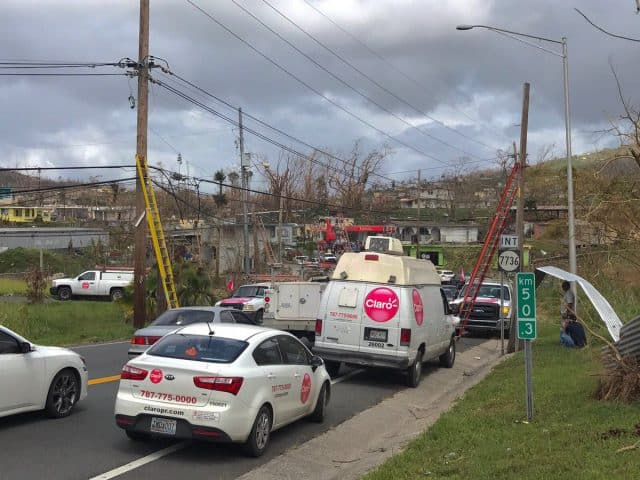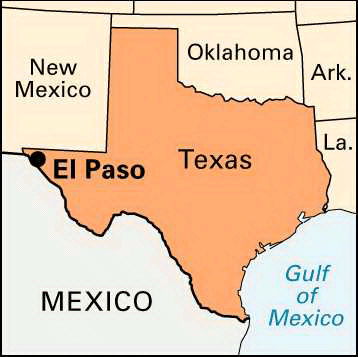 U.S. cell phone providers are facing increasing criticism they are dragging their feet on restoring cell service in Puerto Rico while Mexican-owned Claro has now successfully restored service in 28 of the territory’s 78 municipalities.
U.S. cell phone providers are facing increasing criticism they are dragging their feet on restoring cell service in Puerto Rico while Mexican-owned Claro has now successfully restored service in 28 of the territory’s 78 municipalities.
Claro Puerto Rico, owned by Mexican billionaire Carlos Slim’s America Movil, has dramatically outpaced AT&T, T-Mobile, and Sprint in getting their damaged cell phone facilities back up and running. Claro is Puerto Rico’s second most popular cell company behind AT&T.
“Claro is the only one with service here,” Francisco Portales, 47, a customer of privately held Puerto Rico-based network provider Open Mobile told a Reuters reporter while waiting outside the Claro store in Fajardo hoping to buy a phone.

Looking for a signal.
The FCC’s latest update on Tuesday reported about 88% of Puerto Rico is still without cell service, but the agency does not break down network repairs by carrier, and American providers have declared their specific restoration plans to be confidential.
While AT&T complained the lack of commercial power remained its biggest problem, Claro said it had pre-positioned generators, diesel fuel, battery backups, and vehicles 72 hours before the hurricane hit, which appears to have made all the difference in restoring service.
Sprint said late last week its towers were still standing and “largely intact” although it gave no specific information on when service might be restored. T-Mobile was more frank, reporting “it’s going to be a long road to recovery.”
Claro is not taking advantage of its position as the island’s most reliable post-hurricane carrier, allowing customers of other providers to roam on its network where a signal is available. That may be all the good publicity Claro needs to win over new customers after the hurricane damage is repaired.

Claro’s repair trucks.
Mercedes Saldana, a 54-year-old school cafeteria worker and Sprint customer is just one of many now searching shops for a Claro prepaid phone.
“I don’t have any service, none,” she said. “We don’t know when Sprint’s going to be connected again.”
Customers unwilling to switch carriers and won’t roam may have long travel times ahead of them to find a signal. Luis Pacheco, 64, was planning to drive with his wife to Canovanas — 30 to 40 minutes west — in hopes of finding a cell signal to text his daughter in California. That is the nearest community where AT&T has a signal at the moment.
Before the storm, AT&T dominated Puerto Rico with a 34% market share, followed by Claro Puerto Rico with a 26% share. T-Mobile was third with 19%, Open Mobile has 11% and Sprint 10%. Verizon Wireless has no network facilities in Puerto Rico, but travelers with Verizon phones are granted roaming access on Claro’s network.


 Subscribe
Subscribe Less than a decade ago, AT&T was one of El Paso’s largest private employers, with 2,400 employees. Next month, it will be a shadow of its former self with fewer than 500 local workers after a series of layoffs and call center closures.
Less than a decade ago, AT&T was one of El Paso’s largest private employers, with 2,400 employees. Next month, it will be a shadow of its former self with fewer than 500 local workers after a series of layoffs and call center closures. The union reports the annual salaries for those jobs ranged from $32,000 to $65,000 per year, plus commissions and health and retirement benefits. Offshore customer care centers pay a fraction of those salaries and many third-party contractors do not pay benefits because they designate many employees as part-time workers.
The union reports the annual salaries for those jobs ranged from $32,000 to $65,000 per year, plus commissions and health and retirement benefits. Offshore customer care centers pay a fraction of those salaries and many third-party contractors do not pay benefits because they designate many employees as part-time workers.



